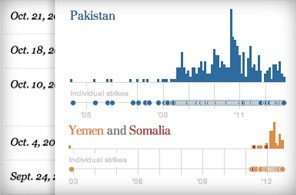Despite repeatedly denouncing the CIA’s drone campaign, top officials in Pakistan’s government have for years secretly endorsed the program and routinely received classified briefings on strikes and casualty counts, according to top-secret CIA documents and Pakistani diplomatic memos obtained by The Washington Post.
The files describe dozens of drone attacks in Pakistan’s tribal region and include maps as well as before-and-after aerial photos of targeted compounds over a four-year stretch from late 2007 to late 2011 in which the campaign intensified dramatically.

Markings on the documents indicate that many of them were prepared by the CIA’s Counterterrorism Center specifically to be shared with Pakistan’s government. They tout the success of strikes that killed dozens of alleged al-Qaeda operatives and assert repeatedly that no civilians were harmed.
Pakistan’s tacit approval of the drone program has been one of the more poorly kept national security secrets in Washington and Islamabad. During the early years of the campaign, the CIA even used Pakistani airstrips for its Predator fleet.
But the files expose the explicit nature of a secret arrangement struck between the two countries at a time when neither was willing to publicly acknowledge the existence of the drone program. The documents detailed at least 65 strikes in Pakistan and were described as “talking points” for CIA briefings, which occurred with such regularity that they became a matter of diplomatic routine. The documents are marked “top secret” but cleared for release to Pakistan.

A CIA spokesman declined to discuss the documents but did not dispute their authenticity.
Aizaz Ahmad Chaudhry, the spokesman for Pakistan’s Foreign Ministry, said his government does not comment on media reports that rely on unnamed sources. But Chaudhry added that Prime Minister Nawaz Sharif, who took office in June, has been adamant that “the drone strikes must stop.”
“Whatever understandings there may or may not have been in the past, the present government has been very clear regarding its policy on the issue,” Chaudhry said. “We regard such strikes as a violation of our sovereignty as well as international law. They are also counter-productive.”
Chaudhry said Pakistan’s government is now unified against U.S. drone strikes, which are deeply unpopular within Pakistan, and has made its disapproval clear to senior U.S. and United Nations officials.
CIA strikes “have deeply disturbed and agitated our people,” Sharif said in a speech Tuesday at the U.S. Institute of Peace, during his first visit to Washington since taking office this year. “This issue has become a major irritant in our bilateral relationship as well. I will, therefore, stress the need for an end to drone attacks.”
In a meeting Wednesday with President Obama, Sharif said, he emphasized “the need for an end to such strikes.” Sharif did not publicly elaborate on how Pakistan would seek to halt a campaign that has tapered off but remains a core part of the Obama administration’s counterterrorism strategy.
- washingtonpost.com
- © 1996-2013 The Washington Post

